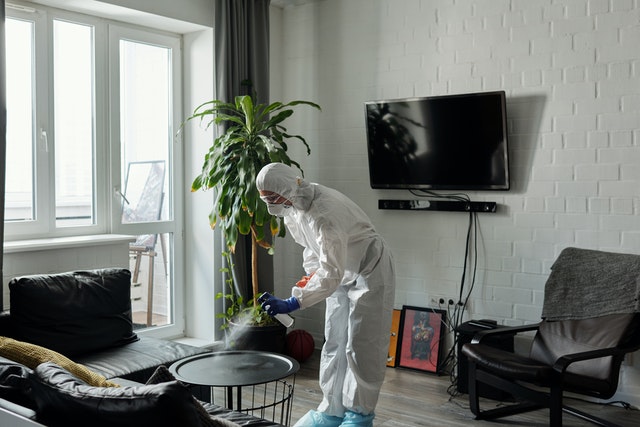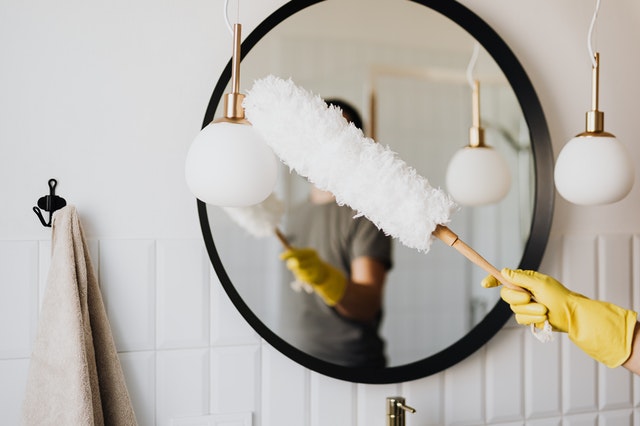Cleaning disorders are a common side of having OCD. It goes far beyond keeping your desk in order, and your clothes ironed. Most people think having an Obsessive Compulsive Disorder is not as real and hard as it is. That’s why here we will tell you all that there’s to know about cleaning disorders and OCD, about the people who have it, how to treat it and how to support them with this disorder.
Obsessive-compulsive disorder comes in a variety of levels, and everyone experiences it differently. For example, some people may feel that they’ll die if they don’t check on the door twenty-seven times, as well as there might be others who feel like something itches if they see their order undone. However, the most common treatment of OCD is cleaning obsession; many people call it obsessive-compulsive cleaning.
Table of Contents
What is OCD?
An Obsessive-Compulsive Disorder is a psychiatric disorder that some people have, in which you might develop certain behaviours. For example, the main symptoms are sometimes having an excessive order, being a perfectionist, and being aware of every detail. However, there are other more extreme behaviours, like feeling the need to do certain things in a specific amount of time. For example, checking the same thing multiple times or having specific ritual’s to do regular tasks.
Most people who don’t have this disorder are interested to see how an obsessive cleaner lives their lives. That’s why there are shows like Obsessive Compulsive Cleaners on TV. These kinds of shows try to take you through every day of someone with cleaning disorders, how they feel and how they see their compulsion.
It’s important to know that people with OCD often find it incredibly hard to overcome their disorder. They don’t control the impulse of cleaning. Actually, They can even feel bodily sick if things around them are dirty or messy. But, there are doing their compulsion to make the thoughts and lousy feelings stop.
Does your spotless kitchen mean you have cleaning disorders?
Now that you think about it, you feel better when everything is shiny but calm down; we got you. There’s a slight difference between cleaning disorders and regular love for perfect sinks. First of all, you must be diagnosed by a professional psychiatrist to know that you have OCD. If you don’t know what the symptoms to watch for are, we’ll share some here.
There are two main groups in which OCD is divided, the first one is obsessions, and the second one is compulsions. We must not confuse these two since they develop differently and may make you act in specific ways. An obsession is an idea that’s true to you and is constantly in your mind. On the other hand, a compulsion is a strong urge to do something.
Where an obsession can not be repressed or decreased, a compulsion might. On the other hand, when talking about OCD, you might already have an obsession that may become a compulsion with time. Now that you know this, you can go beyond and learn about OCD symptoms, how to spot them and how they affect you.

Obsessions and how they can be
There are specific obsessions when talking about cleaning disorders, and you guessed it, they are about, well, cleaning. More than clean floors and done bedrooms, this goes as far as being afraid of germs, infections, or diseases. This can be as difficult as feeling you lose control, a need to be perfect, or a fear that something might hurt you. To help you understand everything better, we will dig into all.
Anxiety over contamination
If you fear germs, diseases, the possibility of being near any dirty-looking place, or even mysterious or dirty fluids, you might have an obsession. But, unfortunately, this kind of obsession doesn’t let you even come close to unknown substances. For you, they must be dangerous and contaminating, and that’s why you have to avoid them.
Hating not having the control
When facing an obsession, anxiety will come in as a guest. For most people with OCD, not having control over certain things in their lives is just a huge no. It can make you feel like you’re in flanger or getting someone else in danger, so you have to make sure that everything you do, you do it the way you want it. For example, in cleaning disorders, you might find yourself doing everything of your own because only you know how to do it.
Fear of hurting
Not only being afraid of hurting yourself but also the people around you, this one is the main reason why cleaning disorders are so hard to control. Your mind might be showing you images of all of the possibly terrible come-outs of taking wrong steps or doing something in the wrong way. You might be afraid that your ability to do things the way you do them is what keeps everything going in safe and sound.
Perfectionism
People with OCD or cleaning disorders feel the need to complete every task with perfection. It doesn’t matter if it is cleaning your desk or brushing your teeth. It must be done in the fullest and best way possible. Being perfect in what you do makes you feel that there’s no danger around and that everything you’ve done is actually gonna work for you.
Compulsions and how they can be
As we said before, obsessive-compulsive disorder is conformed by obsessions and compulsions. To control your obsessions, you engage in compulsions. That’s why OCD or cleaning disorders are challenging to handle. Since compulsions are the next step to obsessions, we will tell you what compulsions look like and their symptoms.
Cleaning disorders
A massive part of OCD is needing and getting things clean. It’s not only about being tidy; it’s about being perfectly sure that there won’t be any germs near you. When experiencing cleaning disorders, you might find yourself giving hours upon hours of your life only to clean. Making sure that everything around you is suitable for contact reassures you. Makes you feel finally calm and good.
Checking behaviors
As an added symptom, you might find yourself feeling losing something or miss checking something. The thought of forgetting if your oven is on, your shower running, or your keys are missing doesn’t let you rest. For people with OCD, everything could go wrong from one moment to another, and it’s vital to make sure it doesn’t.
Repetitive actions
When dealing with constant fears, you will commit to rituals to avoid your anxiety taking over. From taping with your fingers to doing things a specific amount of times, this compulsion makes you constantly conscious of what you’re doing and how you are doing it. For example, maybe you have a particular cleaning routine, with precise rules about how, when, and how much something must be done.
What should you do if you have more than one symptom?

OCD is diagnosed when presenting more than one symptom. Hence, if you feel identified with many of the things we listed before, we advise you to try and learn more about it. Most of these manic feelings come from personal trauma and can be dealt with if you wish. For people with cleaning disorders, their most common experience is dedicating more time to cleaning than to other activities in their lives.
If you’re facing anything like this, you can trust your close ones and seek support from the dearest ones. It could be either in helping you with your tasks or helping you minimize them. You can get a lot of help from your family and friends, but remember that most of the power is in your hands.
How do cleaning disorders affect us
This can get in the way of living specific experiences or enjoying things in your life. On the other hand, it can mean a way for you to feel entirely comfortable in your own space. Either way, cleaning disorders have given us more than spotless spaces. They helped us know more about what goes inside people’s minds.
It has also given us support as members of society. People with cleaning disorders often get along and use this compulsion to help others clean their spaces. Maybe if you have a messy best friend, you like paying them a visit to help clean every once in a while. Or maybe your obsessive cleaner friend likes to go to your place to help you, and now you know why.
After all, we love some order in our spaces, some of us more than others. We might even be guilty of spending hours watching other people clean because, admit it, it is so satisfying. Maybe knowing better what OCD is and what cleaning disorders are can give you a different point of view on the things you may or may not share with obsessive cleaners.





